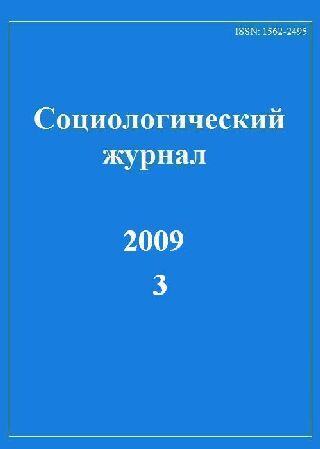Основные элементы и структура межличностного доверия
Аннотация
Литература
Вебер М. Основные социологические понятия // Вебер М. Избранные произведения. М.: Прогресс, 1990.
Гарфинкель Г. Понятие «доверия»: доверие как условие стабильных согласованных действий и его экспериментальное изучение / Пер. с англ. В. Николаева // Социальные и гуманитарные науки. Отечественная и зарубежная социология: Реф. журнал. Сер. 11: Социология. 1999. № 4. С. 126–161.
Левада Ю. Фактор надежды // Мониторинг общественного мнения: экономические и социальные перемены. 2003. № 2 (64). С. 7–17.
Радаев В. Формирование новых российских рынков: трансакционные издержки, формы контроля и деловая этика. М.: Центр политических технологий, 1998.
Селигман А. Проблема доверия / Пер. с англ. И. Мюрберг, Л. Соболевой. М.: Идея-Пресс, 2002.
Фукуяма Ф. Доверие: социальные добродетели и путь к процветанию / Пер. с англ. Д. Павловой и др. М.: Ермак, 2004.
Ядов В. О диспозиционной регуляции социального поведения лично-сти // Методологические проблемы социальной психологии. М., 1975.
Arceneaux C. Trust: An exploration of its nature and significance // Journal of Invitational Theory and Practice.1994. No. 3. P. 5–11.
Bacharach M., Gambetta D. Trust in signs // Trust in society/ Ed. by K.S. Cook. New York: Russel Sage, 2001.
Barbalet J. Emotion, social theory, and social structure. Cambridge: Cam-bridge University Press, 1998.
Barney J., Hansen M. Trustworthiness as a source of competitive ad-vantage // Strategic Management Journal. 1994. No. 15.
Bhattachrya R., Devinney T., Pillutla M. A formal model of trust based on outcomes // Academy of Management Review. 1998. No. 23 (3). P. 459–472.
Burke P. Trust and commitment through self-verification // Social Psycholo-gy Quarterly. 1999. Vol. 62. No. 4. P. 347–366.
Castaldo S. Meanings of trust [online]. Date of access: 10.01.2006. URL:
Castaldo S. Trust variety: Conceptual nature, dimensions and typologies [online]. Date of access: 10.01.2006. URL:
Castelfranchi C. Degrees of trust. Paper presented on conference Trust Man-agement, University of Crete, 28–30 May, 2003. Date of access: 10.09.2009. URL:
Trust in society / Ed. by K. Cook. New York: Russel Sage, 2001.
Dasgupta P. Trust as commodity / Trust: Making and breaking cooperative relations. Ch. 10. Oxford: University of Oxford, 2000. P. 49–72.
Delhey J., Newton K. Predicting cross-national level of social trust // Europe-an Sociological Review. 2005. Vol. 21. No. 4. P. 311–327.
Eisenstadt S., Roninger L. Patrons, clients and friends. Cambridge: Cam-bridge University Press, 1984.
Gambetta D. Can we trust in trust // Trust: Making and breaking cooperative relations. Ch. 10. Oxford: University of Oxford, 2000. P. 213–237.
Gefen D. The conceptualization of trust, risk and their relationship in elec-tronic commerce [online]. Date of access: 20.02.2007. URL:
Glaeser E. Measuring trust // The Quarterly Journal of Economics. 2000. Vol. 65 (August). P. 811–846.
Good D. Individuals, interpersonal relations, and trust / Trust. New York: Basil Blackwell, 1998.
Hardin R. The street-level epistemology of trust // Politics&Society. 1993. Vol. 21. No. 4. P. 505–529.
Hardin R. Trustworthiness // Ethics. 1993. October. P. 26–42.
Heimer C. Solving the problem of trust // Trust in society / Ed. by K.S. Cook. New York: Russel Sage, 2001.
Holland D. An assessment of trust orientation of licensed nursing home ad-ministrators [online]. Date of access: 30.06.2009. URL:
Hosmer L. Trust: The connecting link between organizational theory and philosophical ethics // Academy of Management Review. 1995. Vol. 20. No. 2.
Jones G., George J. The evolution of trust and cooperation: Implications for teamwork and tacit knowledge [online]. Date of access: 14.11.2003. URL:
Jones K. Trust as an affective attitude // Ethics. 1996. Vol. 107. No. 1. P. 4–25.
Kollock P. The emergence of exchange structures: An experimental study of uncertainty, commitment, and trust // American Journal of Sociology. 1994. Vol. 100. No. 2. P. 313–345.
Luhmann N. Familiarity, confidence, trust: Problems and alternatives / Trust: Making and breaking cooperative relations. Ch. 6. Oxford: University of Ox-ford, 2000. P. 94–107.
Luhmann N. Trust and power. Chichester: Wiley, 1979.
Miller J. Trust: The moral importance of an attitude // Practical Philosophy. 2000. Vol. 3. P. 45–54.
Meents S., Tan Y., Verhagen T. Distinguishing different types of trust in online B2B marketplace [online]. Date of access: 15.01.2007. URL:
Misztal B. Trust in modern societies. Cambridge: Polity Press, 1996.
Mollering G. The trust/control duality: An integrative perspective on positive expectations of other // International Sociology. 2005. Vol. 20. No. 3. P. 283–306.
Oldroyd J. Interpersonal trust and the reversal of attribution error // Kellogg Journal of Organization Behavior. [online]. Date of access: 2.10.2009. URL:
Romahn E., Hartman F. Trust: A new tool for project managers [online]. Date of access: 21.11.2003. URL:
Rose-Ackerman S. Trust, honesty, and corruption: Reflection on the state-building process [online]. Date of access: 11.01.2006. URL:
Sztompka P. Trust: A sociological theory. Cambridge: Cambridge University Press, 1999.
Ullmann-Margalit E. Trust, distrust, and in between // Distrust / Ed. by R. Hardin. New York: Russel Sage Foundation, 2004. P. 60–82.
Uslaner E. The moral foundations of trust. Cambridge: Cambridge Universi-ty Press, 2002.
Walczuch R., Seelen J., Lundgren H. Psychological determinants of consum-er trust in e-retailing. Paper for Eight research symposium of emerging electronic market [online]. Date of access: 23.03.2007. URL:
World database of trust [online]. Date of access: 10.07.2006. URL:
Yamagishi T. Trust and social intelligence: The evolutionary game of mind and society. Tokio: Tokio University Press, 1998.
Yoshino R. A time to trust: A study on people’s sense of trust // Behaviormetrika. 2002. Vol. 29. No. 2. P. 231–260.
Все права на статью принадлежат авторам. Авторы передают права на использование статьи, в том числе на использование статьи в открытом доступе, издателю журнала на условиях неисключительной лицензии (Авторское соглашение (публичная оферта))
Принятием условий этого договора автором считается передача им материалов в редакцию через официальный сайт журнала ("Отправить рукопись") или через электронную почту редакции.











